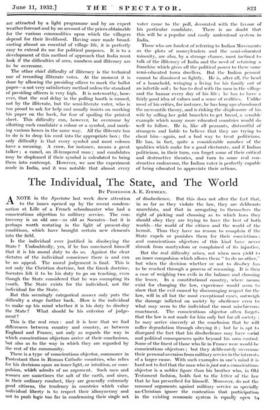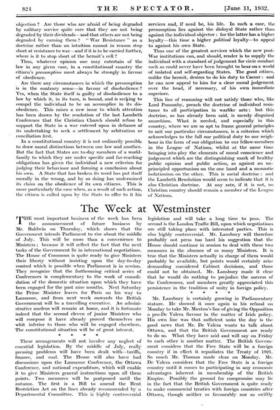The Individual, The State, and The World
BY PROFESSOR A. E. ZINIMERN.
ANOTE in the Spectator last week drew attention to the issues opened up by the recent condem- nation at Lille of a French schoolmaster who had a conscientious objection to military service. The con- troversy is an old one—as old as Socrates—but it is perhaps worth restating in the light of present-day conditions, which have brought certain new elements into the field.
Is the individual ever .justified in disobeying the State ? Undoubtedly, yes, if he has convinced himself that it is his moral duty to do so. Against the clear dictates of the individual conscience there is and can be no appeal. The moral judgement is final. This is not only the Christian doctrine, but the Greek doctrine. Socrates felt it to be his duty to go on teaching, even though the State considered that he was corrupting its youth. The State exists for the individual, not the individual for the State.
But this seemingly categorical answer only puts the difficulty a stage further back. .How is the individual to make up his mind whether it is his duty to disobey the State? What should be his criterion of judge- ment?
This is the real crux : and it is here that we find differences • between country and country, as between England and France, not only as regards the way in which conscientious 'objectors arrive at their conclusions, but also as to the way in which they are regarded by the rest of the community.
There is a type of conscientious objector, commoner in Protestant than in Roman Catholic countries, who relies for his decisions upon an inner light, or intuition;or com- pulsion, which 'admits of no argument. Such men and women are sOnietimes the salt of the earth, and since, in their ordinary conduct, they are generally -extremely good citizens, the tendency in countries which value individual liberty is to respect their idiosyncrasy and not to push logic- too far in condemning their single act of disobedience. But this does not alter the fact that, in so far as they violate the law, they are deliberate anarchists, and that in arrogating to themselves the right of picking and choosing as to which laws they should obey they are frying to have the best of both worlds—the -world of the citizen and the world of the hermit. Thus they have no reason to complain if the State expels or punishes them for their convictions : and conscientious objectors of this kind have never shrunk from martyrdom or complained of its injustice.
But the real difficulty arises, not when men yield to an inner compulsion which allows them " to do no other," but when the decision whether or not to disobey has to be reached through a. process of reasoning. It is then a case of weighing two evils in the balance and choosing the lesser. In a constitutional country, where means exist for changing the law, experience would seem to show that the evil caused by discouraging respect for the Jaw, will in all but the most exceptional cases, outweigh the damage inflicted on society by obedience even to what may seem to the individual the most mischievous enactment. The conscientious objector often forgets that the law is not made for him only but for all society : he may arrive sincerely at the conclusion that he will suffer degradation through obeying it ; but he is apt to disregard the fact that his disobedience may have social and political consequences quite beyond his own control. Some of the finest of those who lie in France were would-be conscientious objectors ; but they deliberately overcame their personal aversion from military service in the interests of a larger cause. With such examples in one's mind it is hard not to feel that the man who is just not a conscientious objector is a nobler figure than his brother who, in Old Testament fashion, holds fast to the letter of the law Mit he has prescribed for himself. Moreover, do not the reasoned arguments against military service as specially un-Christian ignore the contention that participation in the existing economic system is equally open to
objection ? Are those who are afraid of being degraded by military service quite sure that they are not being degraded by their dividends—and that others are not being degraded by earning them ? "War Resistance" as a doctrine rather than an intuition cannot in reason stop short at resistance to war—and if it is to be carried further, where is it to stop short of the hermit's cell ?
Thus, whatever opinion one may entertain of the law in any given case, in a constitutional country the citizen's presumption must always be strongly in favour of obedience.
Are there any circumstances in which the presumption is in the contrary sense—in favour of disobedience ? Yes, when the State itself is guilty of disobedience to a law by -which it, in its turn, is bound, and is seeking to compel the individual to be an accomplice in its dis- obedience. This raises a new issue to which attention has been drawn by the resolution of the last Lambeth Conference that the Christian Church should refuse to support the State in a war entered upon in defiance of its undertaking to seek a settlement by arbitration or conciliation first.
In a constitutional country it is not ordinarily possible to draw moral distinctions between one law and another. But the fact that States are to-day members of a worhl- family to which they are under specific and far-reaching obligations has given the individual a new criterion for judging their behaviour and forming a conclusion about his own. A State that has broken its word has put itself morally in the wrong, and by so doing has undermined its claim on the obedience of its own citizens. This is more particularly the case when, as a result of such action, the citizen is called upon by the State to -offer to it his services and, if need be, his life. In such a ease, the presumption lies against the disloyal State rather than against the individual objector : for the latter has a higher loyalty—this time a higher political loyalty—to appeal to against his own State.
Thus one of the greatest services which the new post- War institutions can, and should, render is to supply the individual with a standard of judgement for civic conduct such as could never have been brought to bear on a world • of isolated and self-regarding States. The good citizen, unlike the hermit, desires to do his duty to Caesar : and be can now appeal to him for a clear moral judgement over the head, if necessary, of his own. immediate . superiors.
This line of reasoning will not satisfy -those who, like Lord Ponsonby, preach the doctrine of individual resis- tance to all participation in warlike acts: but this doctrine, as has already been said, is merely disguised anarchism. What is needed, and especially in this -country, where we are so apt to frame general principles to suit our particular circumstances, is a criterion which acknowledges to the full our political duty to our neigh- bour in the form of our obligation to our fellow-members in the League of Nations, whilst at the same time bringing into play the elements of moral conscience and judgement which are the distinguishing mark of healthy public opinion and public action, as against an un- principled opportunism on the one hand and a monastic isolationism on the other. This is social doctrine : and the Lambeth Resolution would seem to indicate that it is also Christian doctrine. At any rate, if it is not, no Christian country should remain a member of the League of Nations.



































 Previous page
Previous page